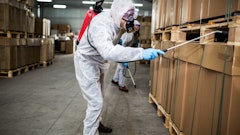
BSI unveiled its Supply Chain Risk Insights 2020 Report, which identifies the trends and associated risks impacting global supply chains in the year ahead.
“As incidents such as political protests, severe weather events and acts of terrorism occur globally, businesses will need to prepare their supply chain for these concerns to ensure stability in the face of uncertainty,” says Jim Yarbrough, global intelligence program manager at BSI. “The trends and incidents of 2019 have set the stage for new, deeper challenges in 2020 and beyond, requiring the global business environment to reassess their strategies to ensure stability and continuity.”
The report, powered by BSI’s Supply Chain Risk Exposure Evaluation Network (SCREEN) tool, uses SCREEN intelligence to predict the following trends will dominate the global supply chain throughout the year ahead:
Coronavirus – Tackling a global outbreak
The Coronavirus disease (COVID-19) outbreak has highlighted the current fragility of global supply chains wherein the failure of one link in the chain has the potential to cause extensive disruptions throughout. As companies adjust to the impact on their supply chains by the downtime and slowed restart of Chinese manufacturing, the spread of COVID-19 globally will lead to complex and varied responses by individual governments to contain the virus, creating further disruptions and requiring businesses to adopt adaptive business continuity measures. The outbreak highlights the need for comprehensive business continuity planning that considers all types of potential natural disasters, including disease outbreaks. Lessons learned from the COVID-19 outbreak on how to better mitigate disease spread and absorb delays to manufacturing and global shipping will shape how businesses and supply chains are able to respond to other possible outbreaks in the future.
Shifting supply chains in Asia
As the United States and China engaged in their ongoing trade dispute, other countries throughout the region such as Vietnam, Myanmar, Cambodia, Malaysia, Thailand, and Bangladesh all worked to create a more attractive business environment. Now, as companies are concerned over their supply chains in Asia amid the coronavirus outbreak and pursue other opportunities, industries must consider the corporate social responsibility risks still rife in China and throughout the region, including the presence of child labour, forced labour, and poor working conditions. In addition to the coronavirus, natural disasters, invasive species, and diseases ravaged the continent in 2019, causing widespread destruction of infrastructure and agriculture, all underscoring the need for businesses to develop comprehensive response plans.
Human trafficking and the exploitation of migrants
BSI continues to record incidents of migrants attempting to journey through Europe into the United Kingdom, many times facilitated by traffickers and often through supply chain modalities. Specifically, 88% of all recorded stowaway incidents in Europe used trucking as the transport modality, and 56% of European stowaway incidents involved 10 or more migrants, highlighting the likely involvement of corrupt individuals acting as part of a human trafficking network. Similarly, migrants continue to travel throughout the Americas, seeking refuge in the United States. In 2019, Mexican authorities took a stronger stance in cracking down on migrant flows. As cartel violence increases throughout the country, transporters can expect more frequent attempts by migrants to stowaway in supply chain modalities along with additional security challenges and traffic disruptions. Due to the redeployment of Customs personnel along the U.S.-Mexico border, BSI recorded a 4.5-hour delay in commercial lanes, highlighting how migration can impact supply chains and transport in the region. These issues are likely to continue as the two countries debate the best solutions, requiring businesses to ensure strong continuity plans.
Political protests and global ideological shifts
Last year, BSI noted significant impacts to supply chains caused by disruptive political protests globally. Many of these political movements have already spilled over into 2020 and have the potential to grow and spread throughout the year. As protest movements gain momentum, and the scope of the grievances widens, governments struggle to effectively address and quell the unrest. In 2020, it is critical for businesses to be aware of possible eruptions of social unrest and construct detailed business continuity plans that account for transportation delays, road blockages, and a heightened security environment. Also last year, BSI noted impacts to supply chains in Brazil, India, and Mexico as a result of ideological shifts in governments. In 2020, the consequences of these political changes will continue to reverberate as companies reconsider the risks in these locations from a business continuity perspective and evaluate corporate social responsibility vulnerabilities arising from deregulation.
Impact of climate change on business continuity
Severe weather events arguably impacted India more than any other country last year; by July 2019, BSI had already recorded a 28% increase in natural disaster incidents in India over what our data had shown the year prior. As companies evaluate their supply chains, it is imperative to include an understanding of not only the risk posed by natural disasters themselves, but also the resiliency of the country and its ability to recover from such disasters. Last year’s record-setting weather events wreaked havoc on supply chains and, as a result, companies can further expect shortages of agricultural products, destruction and impairment of infrastructure, and increased vulnerabilities for thefts and looting in areas impacted by severe weather events in 2020. Additionally, the continuation of these events will further tax natural disaster resiliency and will result in medium- and long-term reassessments of the viability of some countries as supply chain partners.
Global risk of terrorism and tensions in the Middle East
As political protests continue to grow and intensify in 2020, incidents of terrorism are likely to occur as fringe political movements look for new methods to get their message across beyond vandalism and violent marches. BSI’s SCREEN intelligence team recorded an average rate of five supply chain terrorism incidents per day, with 30% of those incidents occurring in Sub-Saharan Africa. As tensions between the U.S. and Iran wax and wane, it is possible that incidents of terrorism could lead to higher levels of supply chain disruption this year.



















